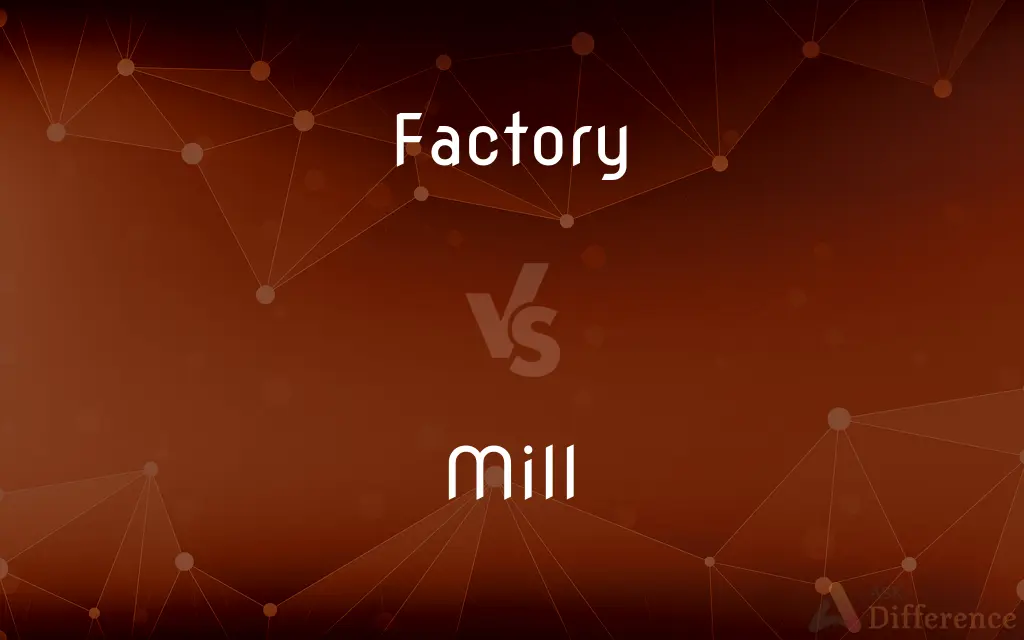Factory vs. Mill — What's the Difference?
By Urooj Arif & Maham Liaqat — Updated on March 21, 2024
A factory is a large industrial building where goods are manufactured or processed, often involving machinery. Mills, however, specifically grind or crush raw materials, like grains or ores.

Difference Between Factory and Mill
Table of Contents
ADVERTISEMENT
Key Differences
Factories are large industrial buildings where goods are manufactured or assembled using machinery, often involving a variety of processes and a large workforce. They can produce a wide range of products, from electronics to vehicles. Mills, on the other hand, refer to establishments that grind or crush raw materials. These materials can range from grains, used in flour mills, to ores in mining operations. Mills are specialized facilities focusing on the transformation of raw materials into a form that can be further used or processed.
Factories are characterized by their ability to handle diverse manufacturing processes under one roof. They may incorporate several production lines with machinery for different stages of manufacturing, including assembly, testing, and packaging. Mills, whereas, are more specialized, focusing on breaking down, grinding, or processing raw materials. The output of mills is often used as input for factories or other industries.
The term "factory" often implies a larger scale of production and a wider variety of operations compared to a mill. Factories may also be more automated, utilizing advanced technology and robotics to increase efficiency and reduce the need for manual labor. On the other hand, mills, though they can be automated, typically focus on a single process or a series of related processes.
Environmental impact is another area where factories and mills can differ significantly. Factories, depending on the industry, can have a wide range of environmental impacts, from emissions to waste production. Mills, particularly those processing natural materials, can also have significant environmental impacts, especially if they involve deforestation, water use, or chemical processing.
Both factories and mills play crucial roles in the global economy, supplying raw materials and finished goods for various markets. However, the nature of their operations, the scale of production, and their impact on the environment and society can vary greatly between the two.
ADVERTISEMENT
Comparison Chart
Purpose
Manufactures or processes goods, often involving multiple production lines.
Grinds or crushes raw materials into usable forms.
Operations
Diverse, can include assembly, testing, and packaging.
Specialized, focusing on grinding or crushing.
Scale
Typically larger, with a broader scope of production.
Usually more focused on a specific type of material or process.
Technology
Often highly automated, utilizing advanced machinery and robotics.
Can be automated, but focuses on processing equipment for specific materials.
Environmental Impact
Can vary widely, but often involves emissions and waste production.
Often involves significant resource use, but impact varies by material processed.
Compare with Definitions
Factory
A building or group of buildings equipped for processing materials into goods.
The textile factory weaves raw cotton into fabric.
Mill
A machine or apparatus for grinding any type of material.
The sawmill processes logs into planks for construction.
Factory
A workshop or series of buildings where goods are made or assembled.
The toy factory designs and manufactures a wide range of children’s toys.
Mill
A facility where raw materials, like grains or ores, are ground into flour or crushed.
The mill grinds wheat into flour for bread making.
Factory
A facility with the means for manufacturing goods, often involving machinery and labor.
The factory on the outskirts of town produces electronic gadgets.
Mill
An establishment that processes or manufactures materials by grinding or crushing.
The steel mill produces rods and sheets from raw metal ores.
Factory
An industrial site where workers assemble products in large quantities.
The car factory employs thousands, making it the biggest employer in the region.
Mill
A unit of machinery for grinding or pulverizing substances.
The coffee mill finely grinds beans for a fresh brew.
Factory
A place where raw materials are transformed into finished products.
The chocolate factory processes cocoa beans into various chocolate products.
Mill
A building equipped with machinery for grinding grain into flour.
Factory
A factory, manufacturing plant or a production plant is an industrial site, often a complex consisting of several buildings filled with machinery, where workers manufacture items or operate machines which process each item into another. They are a critical part of modern economic production, with the majority of the world's goods being created or processed within factories.
Mill
A factory fitted with machinery for a particular manufacturing process
A steel mill
A mill town
Factory
A building or group of buildings in which goods are manufactured; a plant.
Mill
An engine.
Factory
See factory ship.
Mill
A boxing match or a fist fight.
Factory
A business establishment for commercial agents or factors in a foreign country.
Mill
A monetary unit used only in calculations, worth one thousandth of a dollar.
Factory
The source of prolific production
A rock group that was a hit-tune factory.
A motel that served as an illegal drug factory.
Mill
Grind (something) in a mill
Hard wheats are easily milled into white flour
Factory
The position or state of being a factor.
Mill
Cut or shape (metal) with a rotating tool
In the machine shop we mill and grind the castings
Factory
A trading establishment, especially set up by merchants working in a foreign country.
Mill
(of people or animals) move around in a confused mass
Tourists were milling about in the lobby
Factory
A building or other place where manufacturing takes place.
History has shown that, even without cheap labor, factories run perfectly well.
Mill
Thicken (wool or another animal fibre) by fulling it
Ordinary wool blankets are made by milling a woven wool fabric
Factory
A police station.
Mill
A building equipped with machinery for grinding grain into flour or meal.
Factory
A device or process that produces or manufactures something.
Mill
A device or mechanism that grinds grain.
Factory
A factory farm.
Chicken factory; pig factory
Mill
A building or farm equipped with machinery that presses or grinds fruit to extract the juice
A cider mill.
Factory
(programming) In a computer program or library, a function, method, etc. which creates an object.
Mill
A device or machine used to extract juice from fruit.
Factory
Having come from the factory in the state it is currently in; original, stock.
See how there's another layer of metal there? That's not factory.
Mill
A machine or device that reduces a solid or coarse substance into pulp or minute grains by crushing, grinding, or pressing
A pepper mill.
Factory
A house or place where factors, or commercial agents, reside, to transact business for their employers.
Mill
A building or group of buildings equipped with machinery for processing raw materials into finished or industrial products
A textile mill.
A steel mill.
Factory
The body of factors in any place; as, a chaplain to a British factory.
Mill
A machine, such as one for stamping coins, that produces something by the repetition of a simple process.
Factory
A building, or collection of buildings, appropriated to the manufacture of goods; the place where workmen are employed in fabricating goods, wares, or utensils; a manufactory; as, a cotton factory.
Mill
A steel roller bearing a raised design, used for making a die or a printing plate by pressure.
Factory
A plant consisting of buildings with facilities for manufacturing
Mill
Any of various machines for shaping, cutting, polishing, or dressing metal surfaces.
Mill
A process, agency, or institution that operates in a mechanical way or turns out products in the manner of a factory
The college was nothing more than a diploma mill.
Mill
A business that breeds and sells animals, such as purebred puppies, often in substandard conditions. Often used in combination
A puppy mill.
Mill
A difficult or laborious series of experiences
Went through the mill trying to get approval to build an addition onto the house.
Mill
A unit of currency equal to 1/1000 of a US dollar or 1/10 of a cent.
Mill
To grind, pulverize, or break down into smaller particles in a mill
Mill grain.
Mill
To produce or process mechanically in a mill
Mill steel.
Mill
To cut, shape, or finish in a mill or with a milling tool
Logs that are milled for lumber.
Mill
To produce a ridge around the edge of (a coin).
Mill
To groove or flute the rim of (a coin or other metal object).
Mill
Western US To cause (cattle) to move in a circle or tightening spiral in order to stop a stampede.
Mill
To move around in churning confusion
"A crowd of school children milled about on the curb looking scared" (Anne Tyler).
Mill
(Slang) To fight with the fists; box.
Mill
To undergo milling
Grain that mills well.
Mill
A grinding apparatus for substances such as grains, seeds, etc.
Pepper mill
Pepper has a stronger flavor when it is ground straight from a mill.
Mill
The building housing such a grinding apparatus.
My grandfather worked in a mill.
Mill
A machine used for expelling the juice, sap, etc., from vegetable tissues by pressure, or by pressure in combination with a grinding, or cutting process.
A cider mill; a cane mill
Mill
A machine for grinding and polishing.
A lapidary mill
Mill
A milling machine for machining of solid metal, wood, or plastic.
Lathes, mills, and drill presses
Mill
The raised or ridged edge or surface made in milling anything, such as a coin or screw.
Mill
A manufacturing plant for paper, steel, textiles, etc.
Mill
A building housing such a plant.
Mill
(figurative) An establishment that handles a certain type of situation or procedure routinely, or produces large quantities of an item without much regard to quality, such as a divorce mill, a puppy mill, etc.
Mill
An institution awarding educational certificates not officially recognised
Mill
(informal) An engine.
Mill
(informal) A boxing match, fistfight.
Mill
(die sinking) A hardened steel roller with a design in relief, used for imprinting a reversed copy of the design in a softer metal, such as copper.
Mill
(mining) An excavation in rock, transverse to the workings, from which material for filling is obtained.
Mill
(mining) A passage underground through which ore is shot.
Mill
A milling cutter.
Mill
(historical) A prison treadmill.
Mill
A typewriter used to transcribe messages received.
Mill
An obsolete coin worth one thousandth of a US dollar, or one tenth of a cent.
Mill
One thousandth part, particularly in millage rates of property tax.
Mill
A line of three matching pieces in nine men's morris and related games.
Mill
(trading card games) Discarding a card from one's deck.
Mill
(trading card games) A strategy centered on depleting the opponent's deck.
Mill
(transitive) To grind or otherwise process in a mill or other machine.
To mill flour
Mill
(transitive) To shape, polish, dress or finish using a machine.
Mill
(transitive) To engrave one or more grooves or a pattern around the edge of (a cylindrical object such as a coin).
Mill
To move about in an aimless fashion.
I didn't have much to do, so I just milled around the town looking at the shops.
Mill
(transitive) To cause to mill, or circle around.
To mill cattle
Mill
To swim underwater.
Mill
To swim suddenly in a new direction.
Mill
To beat; to pound.
Mill
To pass through a fulling mill; to full, as cloth.
Mill
(transitive) To roll (steel, etc.) into bars.
Mill
(transitive) To make (drinking chocolate) frothy, as by churning.
Mill
(intransitive) To undergo hulling.
This maize mills well.
Mill
To take part in a fistfight; to box.
Mill
To fill (a winze or interior incline) with broken ore, to be drawn out at the bottom.
Mill
To commit burglary.
Mill
To move (a card) from a deck to the discard pile.
Mill
To destroy (a card) due to having a full hand.
Mill
A money of account of the United States, having the value of the tenth of a cent, or the thousandth of a dollar.
Mill
A machine for grinding or comminuting any substance, as grain, by rubbing and crushing it between two hard, rough, or indented surfaces; as, a gristmill, a coffee mill; a bone mill.
Mill
A machine used for expelling the juice, sap, etc., from vegetable tissues by pressure, or by pressure in combination with a grinding, or cutting process; as, a cider mill; a cane mill.
Mill
A machine for grinding and polishing; as, a lapidary mill.
Mill
A common name for various machines which produce a manufactured product, or change the form of a raw material by the continuous repetition of some simple action; as, a sawmill; a stamping mill, etc.
Mill
A building or collection of buildings with machinery by which the processes of manufacturing are carried on; as, a cotton mill; a powder mill; a rolling mill.
Mill
A hardened steel roller having a design in relief, used for imprinting a reversed copy of the design in a softer metal, as copper.
Mill
An excavation in rock, transverse to the workings, from which material for filling is obtained.
Mill
A milling cutter. See Illust. under Milling.
Mill
A pugilistic encounter.
Mill
Short for Treadmill.
Mill
The raised or ridged edge or surface made in milling anything, as a coin or screw.
Mill
A building or complex of buildings containing a mill{1} or other machinery to grind grains into flour.
Mill
To reduce to fine particles, or to small pieces, in a mill; to grind; to comminute.
Mill
To shape, finish, or transform by passing through a machine; specifically, to shape or dress, as metal, by means of a rotary cutter.
Mill
To make a raised border around the edges of, or to cut fine grooves or indentations across the edges of, as of a coin, or a screw head; also, to stamp in a coining press; to coin.
Mill
To pass through a fulling mill; to full, as cloth.
Mill
To beat with the fists.
Mill
To roll into bars, as steel.
Mill
To swim under water; - said of air-breathing creatures.
Mill
To undergo hulling, as maize.
Mill
To move in a circle, as cattle upon a plain; to move around aimlessly; - usually used with around.
The deer and the pig and the nilghar were milling round and round in a circle of eight or ten miles radius.
Mill
To swim suddenly in a new direction; - said of whales.
Mill
To take part in a mill; to box.
Mill
To fill (a winze or interior incline) with broken ore, to be drawn out at the bottom.
Mill
To cause to mill, or circle round, as cattle.
Mill
A plant consisting of buildings with facilities for manufacturing
Mill
Scottish philosopher who expounded Bentham's utilitarianism; father of John Stuart Mill (1773-1836)
Mill
English philosopher and economist remembered for his interpretations of empiricism and utilitarianism (1806-1873)
Mill
Machine that processes materials by grinding or crushing
Mill
The act of grinding to a powder or dust
Mill
Move about in a confused manner
Mill
Grind with a mill;
Mill grain
Mill
Produce a ridge around the edge of;
Mill a coin
Mill
Roll out (metal) with a rolling machine
Common Curiosities
What is the main purpose of a factory?
To manufacture or process goods using machinery and labor.
Can mills be considered factories?
Mills are a type of factory specialized in grinding or crushing materials.
Are all factories large and automated?
Many factories are large and utilize automation, but size and technology use can vary.
How does a mill work?
A mill works by grinding or crushing raw materials into usable forms using machinery.
How do factories impact the environment?
Factories can have a wide range of environmental impacts, including emissions and waste production.
Are mills only related to food production?
No, mills can process a variety of materials, including metals, wood, and minerals.
How can factories reduce their environmental footprint?
By implementing sustainable practices, recycling, and using cleaner technologies.
Do factories only produce physical goods?
Primarily, factories produce physical goods, but they can also be involved in assembling and packaging.
What is the difference between a paper mill and a steel mill?
A paper mill processes wood into paper, whereas a steel mill processes iron ore into steel.
How do technological advancements affect factories?
Technological advancements can increase efficiency, reduce costs, and minimize environmental impacts.
What types of products can mills produce?
Mills can produce flour, crushed ore, lumber, and other processed materials.
What role do factories play in the economy?
Factories are key to manufacturing, contributing significantly to employment and GDP.
Can mills be powered by renewable energy?
Yes, mills can be powered by renewable energy sources, such as wind or water.
What challenges do factories face today?
Challenges include environmental regulations, labor issues, and maintaining competitiveness.
Why are mills important in agriculture?
Mills process grains into flour and other products, essential for food production.
Share Your Discovery

Previous Comparison
Leech vs. Slug
Next Comparison
Pest vs. InsectAuthor Spotlight
Written by
Urooj ArifUrooj is a skilled content writer at Ask Difference, known for her exceptional ability to simplify complex topics into engaging and informative content. With a passion for research and a flair for clear, concise writing, she consistently delivers articles that resonate with our diverse audience.
Co-written by
Maham Liaqat














































